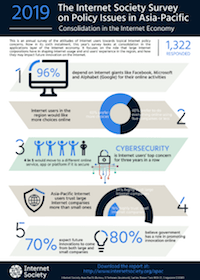Empowering More Gretas: Introducing the 2019 IGF Youth Ambassadors

When 16-year-old Swedish environmental activist Greta Thunberg burst onto the global scene a few months ago, people underestimated the power this young girl would have to raise awareness and rally the world around climate change. Today, she has become a fearless advocate, boldly speaking out and holding politicians to account for their lack of action on the climate crisis. We need more Gretas.
And they’re out there.
We’re proud to introduce 30 young changemakers who make up the 2019 cohort of the Internet Society’s IGF Youth Ambassadors Program. The group is made up of 15 women and 15 men from 21 countries. This cadre of young leaders are working on many of the pressing issues affecting the Internet globally.
In November, they’ll bring their drive for change to Berlin, Germany, to take part in the Internet Governance Forum (IGF). This is an annual multistakeholder forum for inclusive policy dialogue on shared principles, procedures, and programs that shape the evolution and use of the Internet. Although not an official decision-making body, the IGF remains an important forum. Many of the world’s experts in and advocates for the Internet gather there for discussion, networking, research sharing, and best practices from around the Continue reading
In Colombia: Latin American Summit on Community Networks
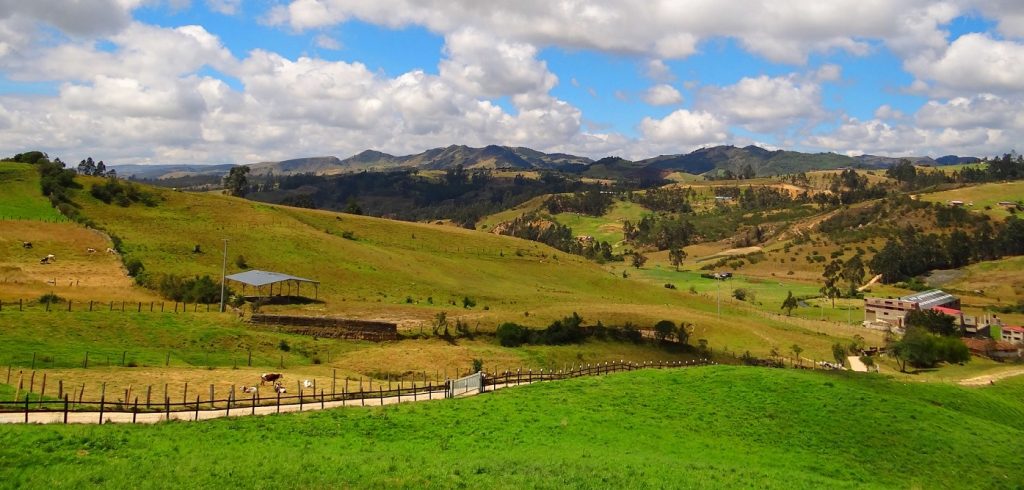
The University of Cundinamarca will host the Second Latin American Summit of Community Networks September 24-28. The event is organized by the Community Networks Special Interest Group, the Fusa Libre Collective, and the Colombia Chapter, with backing from the Internet Society.
The Summit, which will include representatives of 24 organizations that operate community networks in different countries, is meant to be a resource for the region. On the first day there will be 12 presentations that will share experiences from projects developed in countries such as Argentina, Colombia, Ecuador, and Mexico.
During the rest of the Summit, attendees will explore topics that will help strengthen their projects and enhance their development. The topics addressed in these working sessions have been defined collaboratively: gender-related issues, regulatory frameworks, local content, methodological strategies for community work, and actions for the promotion and deployment of new community networks. It could not be otherwise in a community where collaboration has stood out. In addition, attendees can share their experiences and best practices.
Although many people are familiar with the term “community networks,” their collaborative nature can be a surprise to those who are learning about how they function. Seeing people working together to plan, Continue reading
The Week in Internet News: IoT Devices Could Put Privacy at Risk, Study Says
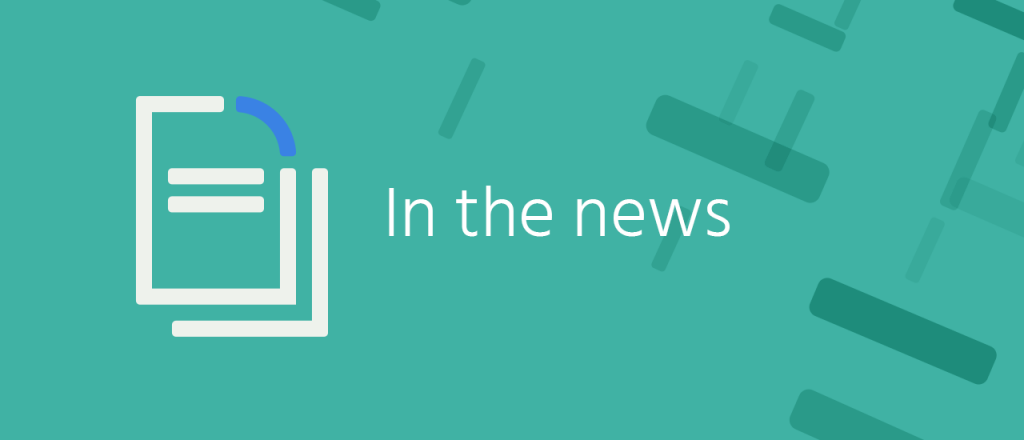
A real privacy headache: Internet of Things devices potentially expose consumer information to other parties, according to a recent study featured on Vice.com. Many IoT devices collect and share a wealth of information including the IP address, usage habits, and location data. That data is then often shared with “a laundry list” of third parties.
Encryption objections: ISP trade groups are objecting to a plan by Google to a new encryption regime for domain name lookups in its Chrome browser and Android operating system, Broadcasting and Cable reports. The plan would give Google too much power, the groups have told U.S. lawmakers.
Moving to the country: Microsoft and Nextlink Internet have unveiled a plan to bring broadband to millions of people living in the rural U.S., WindowsCenteral.com says. The Microsoft Airband Initiative’s goal is to extend broadband access to more than 3 million unserved U.S. residents by mid-2022, with more areas covered by 2024.
The FBI wants in: The U.S. FBI tried to get the operators of encrypted phone carrier Phantom Secure to create a backdoor, as a way to spy on the Sinaloa drug cartel, Vice.com reports. The company was accused Continue reading
APAC Policy Survey 2019: Consolidation in the Internet Economy

The Internet is changing. Consolidation in the Internet economy, the topic of the Global Internet Report 2019, might be the source of ongoing shifts in its underlying infrastructure and the way users engage, among many other things.
Clearly, the growing presence of big Internet platforms can benefit the user by offering seamless Internet experiences, but it could also harm innovation, competition, and the Internet’s broader architecture, says the report, which marks the start of the Internet Society’s efforts to examine this issue.
The Internet in Asia-Pacific is no exception. A few corporations – including Facebook and Tencent in social networking, Google and Baidu in search, and Amazon and Alibaba in online shopping – dominate large parts of the Internet, benefitting people while raising similar questions about what it means for the Internet’s fundamental properties.
This year’s Survey on Policy Issues in Asia-Pacific, released today, helps deepen our understanding of the role that corporations play in shaping Internet use and user experience in the region and how they may impact future innovation on the Internet.
More than 1,300 people from 39 economies in the region took our online survey when we opened it to the public in July.
The Continue reading
Privacy Regulations Are Evolving: Are Organizations Ready?

Privacy statements are both a point of contact to inform users about their data and a way to show governments the organization is committed to following regulations. On September 17, the Internet Society’s Online Trust Alliance (OTA) released “Are Organizations Ready for New Privacy Regulations?“ The report, using data collected from the 2018 Online Trust Audit, analyzes the privacy statements of 1,200 organizations using 29 variables and then maps them to overarching principles from three privacy laws around the world: General Data Protection Regulation (GDPR) in the European Union, California Consumer Privacy Act (CCPA) in the United States, and Personal Information Protection and Electronics Document Act (PIPEDA) in Canada.
In many cases, organizations lack key concepts covering data sharing in their statements. Just 1% of organizations in our Audit disclose the types of third parties they share data with. This is a common requirement across privacy legislation. It is not as onerous as having to list all of the organizations; simply listing broad categories like “payment vendors” would suffice.
Data retention is another area where many organizations are lacking. Just 2% had language about how long and why they would retain data. Many organizations have Continue reading
IoT Privacy for Policymakers: Solutions Need Informed Discussion

The consumer Internet of Things market is growing exponentially – one prediction suggests that people will be using 25 billion connected devices by 2021. These new products promise innovation and convenience, but they can also erode privacy boundaries and expose consumers to risk without their knowledge or consent. Is that a good bargain?
The policy brief “IoT Privacy for Policymakers” explores this question and more.
Do consumers have enough information and choice to make meaningful decisions? Do vendors and service providers have the opportunity and incentive to bring privacy-enhancing innovations to the market? Can the downsides of IoT be mitigated through policy actions – and if so, how?
“IoT Privacy for Policymakers” explains the scope and nature of IoT privacy and the issues it raises. As ever, those issues are multi-party. They cross the boundaries of jurisdictions and sectoral regulations. There are no single-stakeholder solutions, so a multistakeholder approach is needed. Solutions need informed discussion that includes consumer rights, economic incentives, technical options, and regulatory measures. This paper is a positive step in that direction.
The policy brief also includes a “how to” on implementing Privacy by Design and four Guiding Principles and Recommendations:
- Enhance User Continue reading
Sri Lanka Chapter Tackles Internet Restrictions and Cybersecurity Threats

Since its establishment nine years ago, the Internet Society Sri Lanka Chapter has been a key stakeholder in ensuring a free, open, and safe Internet in Sri Lanka.
During the 2018 religious riots and the 2019 Easter bombings in Sri Lanka, when access to social media networks and messaging services was blocked, the Sri Lanka Chapter worked closely with government, media, academia, the private sector, and the general public to inform them about the impact of such restrictions on the Internet. In the aftermath of the 2018 religious riots, the Sri Lanka Chapter issued an appeal letter to the Presidential Secretariat on behalf of Internet Society members in Sri Lanka to lift the social media ban. Earlier this year, after the Easter bombings, the Sri Lanka Chapter organized an online meeting to engage in dialogue with different groups, including government and media agencies, informing them about the wide-ranging economic and social consequences of Internet restrictions, and raising the awareness that preventing online access is rarely an effective solution to conflicts and unrest.
In the attempt to control the spread of misinformation and hate speech, and cut off communications between organizers of attacks, the Internet restrictions also prevented people from connecting Continue reading
The Week in Internet News: Antitrust Investigations of Big Tech Heat Up
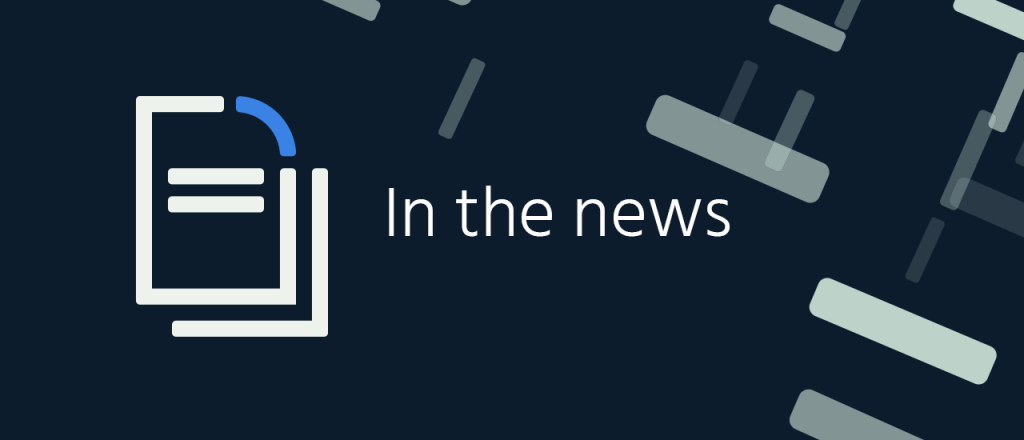
Playing monopoly: Antitrust investigations of large U.S. tech companies are launching, with 48 state attorneys general announcing a Google probe, Salon.com reports. The focus is on Google’s alleged domination of online advertising. Meanwhile, the U.S. House of Representatives Judiciary Committee has asked Facebook, Amazon, Apple, and Google parent company Alphabet to turn over documents in its own antitrust probe, CNBC.com says. The House committee seems to be focused on Facebook’s and Google’s recent acquisitions, Amazon’s promotion of its own products, and other issues.
Broadband Island: Anacortes, Washington, on Fidalgo Island near Seattle, is building its own broadband network, Geekwire.com notes. The city is using existing water lines to install fiber optic cable, and the service will cost residential customers $39 per month for 100 Mbps service and $69 for gigabit speeds.
The Internet of Gasoline: Hackers are increasingly talking about ways to target Internet of Things connected gasoline pumps, ZDNet reports. It’s unclear whether hackers are targeting gas pumps as a way to get cheaper gas or for more destructive reasons. Smart electricity meters are also a target, with the goal of reducing bills, the story suggests.
Free the root: CircleID.com has an Continue reading
Announcing Joseph Hall as SVP for a Strong Internet
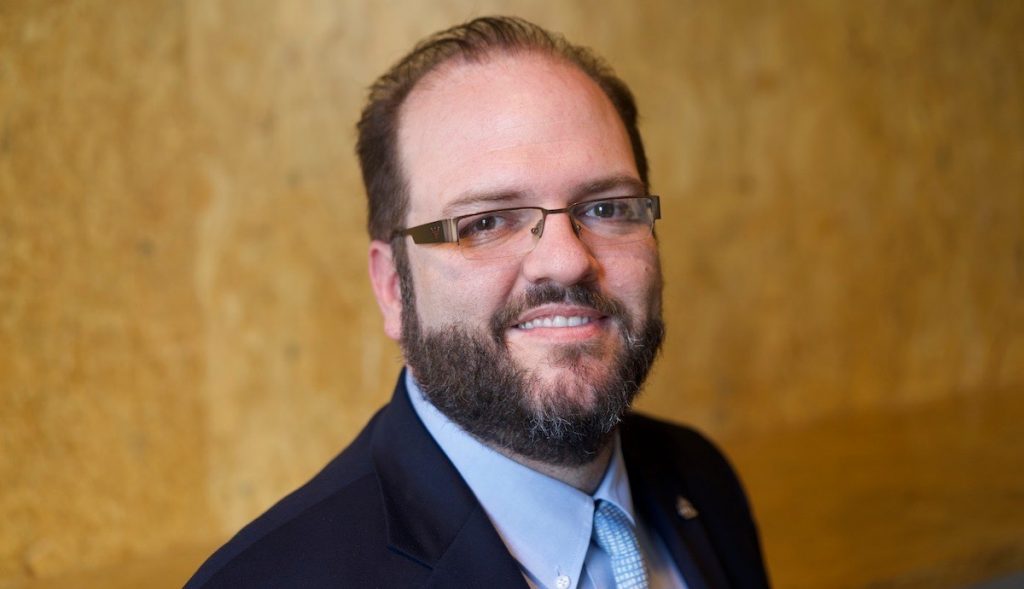
I’m excited to announce that Joseph Lorenzo Hall will join us as our Senior Vice President for a Strong Internet. He will start in October and be based in our Reston, VA, office.
Many of you may know Joe from his work at the Center for Democracy and Technology, where he has been Chief Technologist for about six years. He has a unique ability to put together policy and technical issues, particularly but not only with respect to security. He’s the Vice-Chair of the Board of the California Voter Foundation and a Board member of the Verified Voting Foundation. He went to school at UC Berkeley and received his PhD in Information Systems from there in 2008. A former astrophysicist, he has been working on a monograph about sand clocks, which you may know by the term “hourglass”. I am not kidding even a little when I say you should ask about it, because you will be fascinated. He brings additional strength to our already great group of people who work to make the Internet stronger.
The post Announcing Joseph Hall as SVP for a Strong Internet appeared first on Internet Society.
Voices from the Pacific at APrIGF

The Asia Pacific Regional Internet Governance Forum (APrIGF) was held on 16-19 July 2019 at the recently constructed Far Eastern Federal University on Russky Island in Vladivostok, Russia. The theme of this year’s event was “Enabling a Safe, Secure and Universal Internet for All in Asia Pacific,” with 22 sessions covering six sub-themes: safer Internet, cybersecurity and regulation; access and universality; emerging technologies and society; human rights online; the evolving role of Internet governance (IG) and multistakeholder participation; and digital economy.
The Board of the Pacific Islands Chapter of the Internet Society (PICISOC) was represented by Anju Mangal from Fiji, James Ahwai from Samoa, and myself from the Cook Islands. James Ahwai, a newcomer to the IG scene, participated as a panellist in the opening plenary on The State of Play and Outlook for IG in the Asia Pacific and contributed a Pacific perspective. Anju Mangal, a former member of the IGF Multistakeholder Advisory Group, moderated the closing plenary on APrIGF Multistakeholder Participation in the Global IGF.
I led a workshop, which was a follow-up to a session on “e-Government for Empowering Pacific Citizens,” introduced at the APrIGF in Vanuatu last year. This year, PICISOC Board member, Cherie Lagakali, Continue reading
Network Operators in Mexico Strengthen Their Collaboration
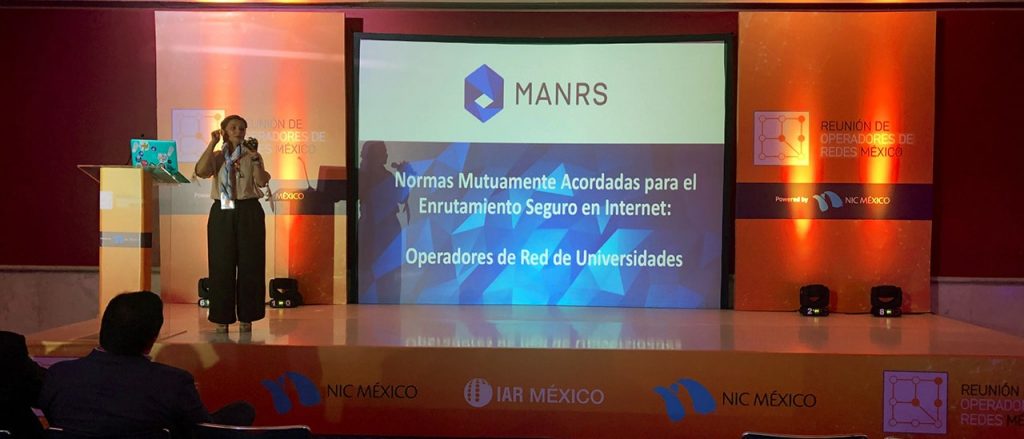
Collaboration is a basic element for Internet development. Without it, connections among networks would be non-existent and the Internet wouldn’t have its global reach. Without it, the Internet wouldn’t exist as we know it. Fortunately, there are many groups that use collaboration and other elements of the Internet networking model.
On August 14, NIC Mexico convened the second meeting of network operators in the country. After a first successful meeting held in 2018, this year’s event exceeded the expectations of the organizers. Edmundo Cázarez, Internet Resource Manager at NIC Mexico, said the organization placed greater emphasis on promoting the meeting among network operators, which led to increased participation.
MEXNOG, as the group of operators is also known, has capitalized on the enthusiasm of the participants through their meetings, but also through a mailing list. In the style of other Internet development groups, the mailing list has served as a meeting point and as a space for exchanging information and best practices among participants.
Therefore, the next step for the group is to strengthen participation in this space, as Edmundo points out: “We want the mailing list to be the contact point of the group. It has been used to Continue reading
The Week in Internet News: Covert Social Media Campaign Champions Military Rulers
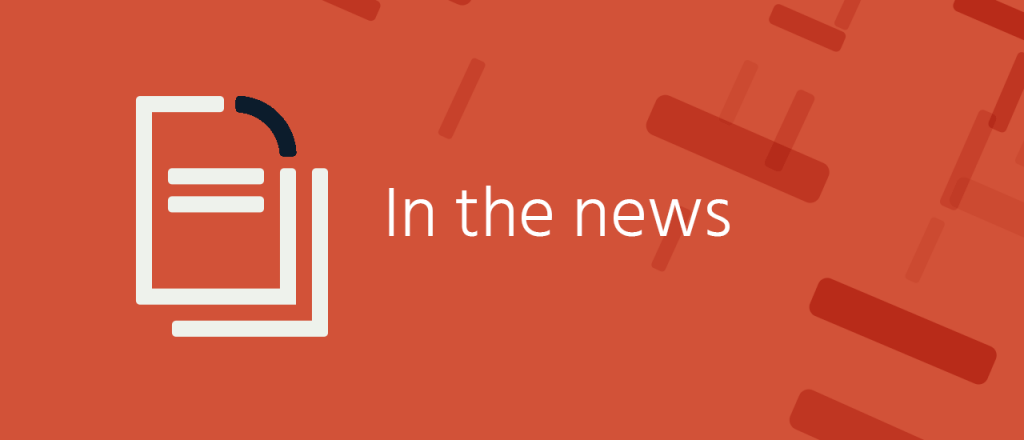
The Internet as warfighting tool: Military rulers in Sudan and other countries are paying “Internet warfare” firms to develop social media campaigns to praise their leadership, the New York Times reports. The story highlights a social media company called New Waves, run by a former member of the Egyptian military and a self-described “researcher on Internet wars.”
Internet warfare, part 2: Meanwhile, a “virtual army” from mainland China has focused on recent protests in Hong Kong, with social media posts boosting government interests, the South China Morning Post writes. New recruits to the nationalist Diba group are taught how to use VPNs and circumvent the government firewall to reach the “battlefield” – social media pages and websites normally banned.
Protestors strike back: The Hong Kong protestors had their own Internet-related tactics, QZ.com reports. In response to threats of Internet shutdown, protestors began to use Bluetooth-based mesh networking technologies, allowing them to communicate through a network of devices that are linked locally, rather than over an Internet connection.
Encryption loves blockchain: The Tide Foundation, a nonprofit building an open-source framework for protecting data, has developed a blockchain-based encryption approach, Silicon Angle says. This type of encryption is much more difficult Continue reading
Hurricane Dorian: We Are Not Dormant

Once again, the world is witnessing the destructive power of a natural disaster. This time, the name is Dorian. What worries us is the fact that wind speeds reached the maximum intensity of five on the Saffir-Simpson scale, causing unprecedented damage to islands of the Bahamas. Of further concern is the fact that some Caribbean countries still have not fully recovered from 2017 storms, Irma and Maria. According to forecasts more storms can be expected as we are in the middle of the hurricane season.
The Caribbean remains vulnerable to natural disasters and this has a huge impact on the social and economic development of the region. According to Professor Jamal Saghir, former World Bank executive, and other experts, 20 percent of the Caribbean GDP is spent on natural disaster recovery. You must realize that we are talking about Small Islands Developing States (SIDS) that are already prone to all kinds of challenges due to their small economies.
Natural disasters are not going away and we can even expect them to have greater destructive power in the future. Although we cannot fight against nature, doing nothing is not an option.
At the Internet Society we work for an Continue reading
The Week in Internet News: Your Doorbell is Spying on You
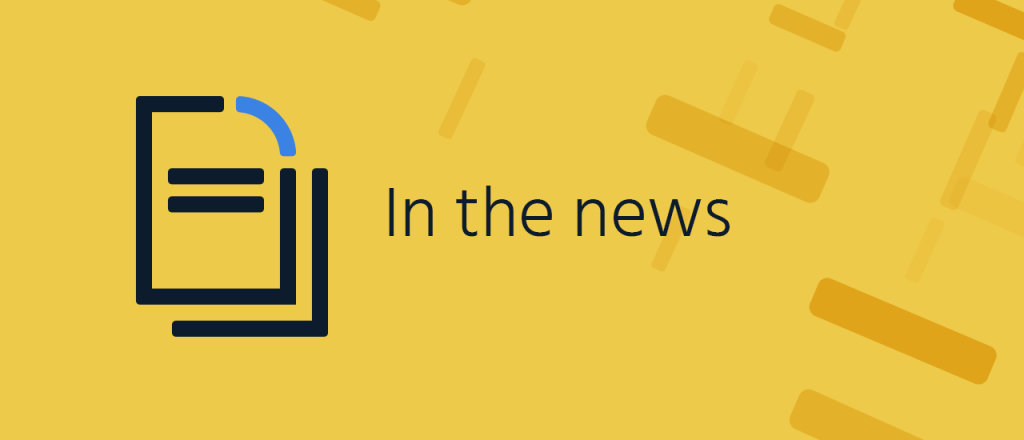
We’ve got our eyes on you: Ring, the Amazon-owned, IoT-powered video doorbell and security system vendor, has partnered with 400 police departments across the U.S. and is providing them with video footage, the Washington Post reports. Privacy advocates have raised concerns, saying the partnerships could subject innocent people, including those who Ring users have flagged as “suspicious,” to greater surveillance.
We’re listening, too: Meanwhile, Apple has apologized for some of its contractors listening in to recordings of customer’s interactions with the Siri digital assistant, Fox Business News says. Apple had been using the recordings for quality control, but the practice was not in line with Apple’s “high ideals,” the company said.
Also, the apps: Google has pulled a popular file-scanning app, CamSpanner, from the Google Play store, after reports that it contains malware, CNN reports. Researchers Kaspersky had found several negative reviews on the app’s profile that complained the app had the “presence of unwanted features.” The malware could show “intrusive advertising” to users.
Internet spycraft: China and other nations are using popular networking site LinkedIn to recruit spies in Western nations, the New York Times reports. One former foreign policy official in U.S. President Barack Obama’s Continue reading
2019 Chapterthon – Our Chapters, Connecting the World One Community at a Time

Each year, the Chapterthon project competition brings enthusiasm and excitement among our global community. We look forward to this time of year, when our communities mobilize and work alongside each other to achieve a common goal for the development of the Internet.
For the 2019 Chapterthon, we are delighted to announce that 34 Chapters and Special Interest Groups (SIGs) from across the globe have started implementing their work on local solutions that will bring some of the hardest-to-reach places and community segments online—connecting the unconnected.
Over the next two months, these 34 projects will:
- connect underprivileged and rural areas in Armenia, Bangladesh, Benin, Mali, and South Africa;
- build a community network in Kenya;
- establish online databases for rural farmers in Burkina Faso and Saint Vincent and the Grenadines;
- create an online audio library for people living with disabilities in northern rural Argentina;
- revolutionize a mobile network unit in Madagascar for use in the event of a natural disaster;
- educate and empower over fifty rural women on how to use the Internet during a friendly game of “Tag”;
- build an FM broadcast system in rural Ghana; preserve Indigenous culture in rural Brazil;
- sweat it out at a bootcamp in Continue reading
Beyond the Palm Trees: Local Action Key to Fast, Affordable and Reliable Internet Solutions in Rural Hawai’i

To many North Americans, Hawai’i is a place of beaches, resorts, surfing, rainforests, and volcanoes — it’s a vacation destination.
But despite its tourism infrastructure and economy, Native Hawaiian communities in the far-flung chain of more than 130 islands face many of the same Internet connectivity challenges as Indigenous communities in Canada and the continental United States. And for a variety of economic, policy and geographic reasons, it is often excluded from efforts to improve access for Indigenous, rural and remote communities.
The Internet Society believes the Internet is for everyone and works with underserved communities to find and create local access solutions in some of the hardest-to-reach places on earth. What’s exciting is that despite the different geographic landscapes, the same community-led solution underway to improve Internet access in the high Arctic could also help Native Hawaiians carve their own path to better connectivity.
That’s why, in 2019, the Internet Society is holding its third annual Indigenous Connectivity Summit (ICS) in Hawai’i.
Including Indigenous voices in the planning and solutions that shape the Internet is a vital part of closing the digital divide. Previous summits in Santa Fe, New Mexico, in 2017, and Inuvik, Northwest Territories, Canada, Continue reading
The Case for Complementary Local Access Networks by the Community, for the Community
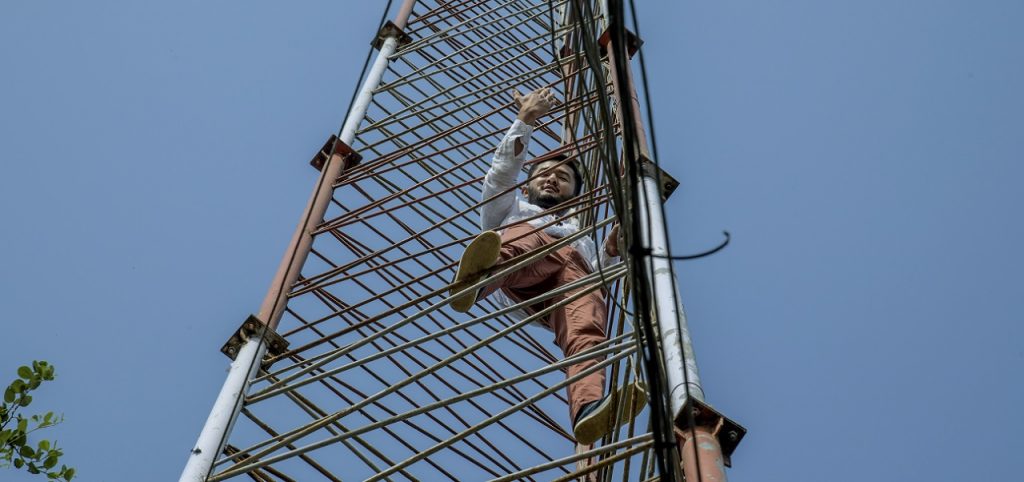
Back in 2010, I conceptualised and started a pilot project to see how we could introduce Internet connectivity to unserved and underserved rural areas. The ICT4D community – along with a number of international organisations – had been talking about how getting people online could transform lives, but most of the solutions appeared to be either top-down or boiler-plated.
My idea was simple – work together with a local partner to find a rural location where getting people online could make a difference, ensure people from the community were trained to operate and maintain the network (rather than being dependent on outsiders), use cheap easy-to-find WiFi equipment (so if things break down, the nearest town would have spares), and then train the community, empowering them to create and use various digital services. Essentially, this was a network for the people, by the people.

Thus was born our award-winning Wireless For Communities (W4C) initiative. We have had a tremendous amount of success with the programme – having deployed and inspired literally hundreds of networks in South Asia and helped connect the most marginalised of communities. This has also become a global programme for the Internet Society Continue reading
Improving Internet Trust: Ironing out the Details

We all can make some pretty rash decisions under stress. I once burned a hole through my undershirt instead of ironing my button-down shirt because I was so nervous before a presentation.
The Internet has its challenges and sometimes can seem like a scary place. In the 2019 survey, the CIGI-Ipsos Global Survey on Internet Security and Trust, 62% of respondents who said they distrust the Internet cited a lack of Internet security as a reason why.
When it comes to facing challenges on the Internet, everyone, from average Internet users to government officials, tends to act the same way I do before presentations – frantically and with questionable results.
In pursuit of security, some governments are making decisions that could harm the Internet as we know it. They’ve taken actions that could weaken digital security, have the potential to fracture the Internet, and some have even shut the Internet down in their country. Like burning a hole through an undershirt and having to wear a wrinkled button-down shirt to a presentation, these actions do little, and make things worse.
The survey results highlighted in our report, “The State of User Privacy and Trust Online,” tell a Continue reading
How “Fresh” is That Privacy Statement?

One of the best practices we advocate and measure in our Online Trust Audit is that privacy statements should have a date stamp visible at the top of the page. This is an issue of transparency and lets readers know when the statement was last updated. Combined with another advocated best practice – access to prior versions of the privacy statement, which unfortunately is offered by only 3% of sites – readers get a sense of what changed between versions and when those changes happened.
For the first time this year, we captured the actual date stamps of more than 1,000 privacy statements across the audited sectors, and though we made some high level comments in the Audit, we thought it would be insightful to show another layer of detail. One of the reasons we captured specific dates was the fact that many privacy statements were updated in the months prior to (or shortly after) May 25, 2018, when the General Data Protection Regulation (GDPR) went into effect in the European Union.
The graph below shows the date stamps from most to least recent (ending with those that have no date stamp) across the audited sectors. The green bars represent Continue reading
6th Middle East School on Internet Governance: Making the Internet Community Stronger in the Middle East
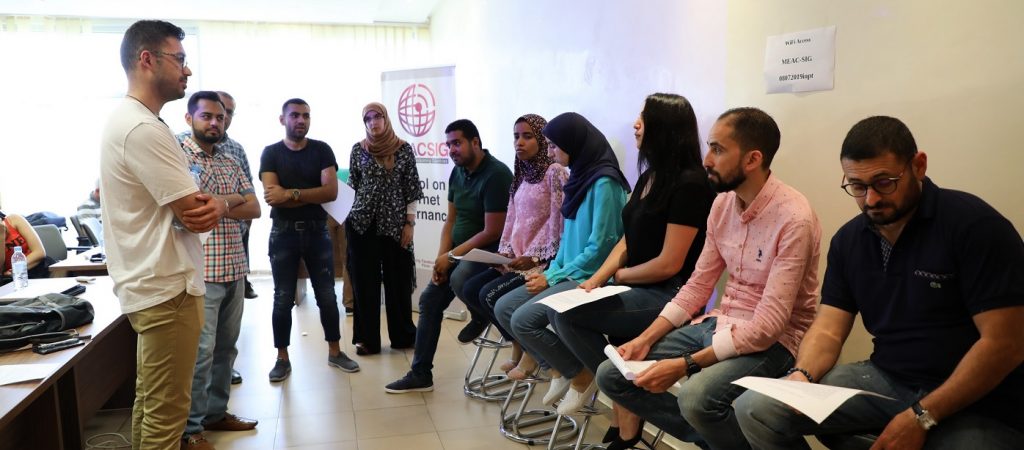
The 6th Middle East School on Internet Governance (MEAC-SIG) took place this year in Rabat, Morocco, from 8-12 July. First held in 2014 in Kuwait, the school is an annual five days of intensive workshops that aims to inform and strengthen the regional Internet community and ensure active participation in national, local, and global Internet Governance fora. This year, it was hosted by The National Telecommunications Regulatory Agency (ANRT) of Morocco, and jointly organized by the Arab World Internet Institute, the Internet Corporation for Assigned Names and Numbers (ICANN), the Internet Governance Project at Georgia Tech, the Internet Society, and RIPE NCC.
The MEAC-SIG faculty includes experts from academia, civil society, business, the technical community, and government stakeholder groups.
This year’s speakers included Milton Mueller of IGP, Internet Governance expert Hanane Boujemi, Miriam Khuene of RIPE NCC, Fahd Batayneh of ICANN, and many other notables. They covered topics such as the IETF’s standardization, GNSO processes, Regional Registries, IGFs in all their capacities, and the inception and a historical view of Internet Governance.
The discussions were carried out in an open environment where everyone contributed their ideas together with multiple stakeholder groups. These groups mentioned how they started their journey in Continue reading
